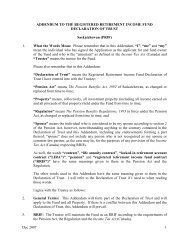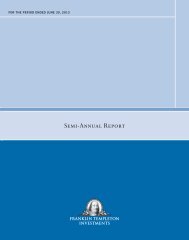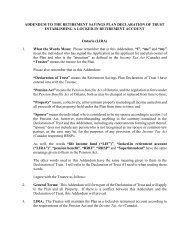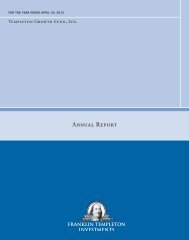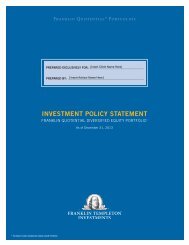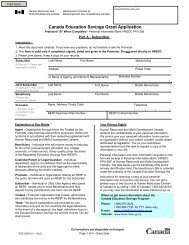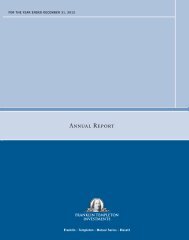and, consequently, we are incurring increased costs of doing business, which potentially negatively impactsour profitability and future financial results. Moreover, any potential accounting or reporting error, whetherfinancial or otherwise, if material, could damage our reputation, adversely affect our ability to conductbusiness, and decrease revenue and net income. Finally, any regulatory and legislative actions and reformsaffecting the mutual fund industry, including compliance initiatives, may negatively impact revenues byincreasing our costs of accessing or dealing in the financial markets or by making certain investmentofferings less favorable to our customers.Changes in tax laws or exposure to additional income tax liabilities could have a material impact onour financial condition, results of operations and liquidity. We are subject to income taxes as well asnon-income based taxes, in both the United States and various foreign jurisdictions and are subject toongoing tax audits in various jurisdictions. Tax authorities may disagree with certain positions we havetaken and assess additional taxes. We regularly assess the likely outcomes of these audits in order todetermine the appropriateness of our tax provision. However, there can be no assurance that we willaccurately predict the outcomes of these audits, and the actual outcomes of these audits could have amaterial impact on our net income or financial condition. Changes in tax laws or tax rulings couldmaterially impact our effective tax rate. For example, proposals for fundamental U.S. international taxreform, such as the recent proposal by the Obama administration, if enacted, could have a significantadverse impact on our future results of operations.Our ability to maintain the beneficial tax treatment we anticipate with respect to non-U.S. earnings wehave repatriated is based on current interpretations of the American Jobs Creation Act of 2004 (the “JobsAct”) and permitted use of such amounts in accordance with our domestic reinvestment plan and the JobsAct. In September 2006, we completed our planned repatriation into the United States of undistributedearnings of our non-U.S. subsidiaries in accordance with our domestic reinvestment plan and the Jobs Act.However, our ability to maintain the anticipated beneficial tax treatment with respect to these non-U.S.earnings is subject to current interpretations and compliance with the Jobs Act (including Internal RevenueCode Section 965), as well as the rules and regulations promulgated by, among others, the Internal RevenueService and the United States Treasury Department. Moreover, changes in the interpretation of these rulesand regulations may have an effect on our ability to maintain the beneficial tax treatment with respect to ourrepatriated non-U.S. earnings. Our inability to appropriately use repatriated amounts for permitted purposesor to otherwise satisfy the requirements of our planned repatriation could also have a negative impact on thescope and breadth of our anticipated tax treatment with respect to such amounts.Any significant limitation or failure of our software applications, technology or other systems that arecritical to our operations could constrain our operations. We are highly dependent upon the use of variousproprietary and third-party software applications and other technology systems to operate our business. Weuse our technology to, among other things, obtain securities pricing information, process client transactions,and provide reports and other customer services to the clients of the funds we manage. Any inaccuracies,delays, or systems failures in these and other processes could subject us to client dissatisfaction and losses.Although we take protective measures, including measures to effectively secure information through systemsecurity technology, our technology systems may still be vulnerable to unauthorized access, computerviruses or other events that have a security impact, such as an authorized employee or vendor inadvertentlycausing us to release confidential information, which could materially damage our operations or cause thedisclosure or modification of sensitive or confidential information. Moreover, loss of confidential customeridentification information could harm our reputation and subject us to liability under laws that protectconfidential personal data, resulting in increased costs or loss of revenue.Further, although we take precautions to password protect our laptops and other mobile electronichardware, if such hardware is stolen, misplaced or left unattended, it may become vulnerable to hacking or26
other unauthorized use, creating a possible security risk and resulting in potentially costly actions by us.Most of the software applications that we use in our business are licensed from, and supported, upgradedand maintained by, third-party vendors. A suspension or termination of certain of these licenses or therelated support, upgrades and maintenance could cause temporary system delays or interruption. In addition,although we currently outsource to a single third-party vendor the operation of our U.S. data centers, we arerevising our operations such that the majority of the services currently performed by the vendor will beperformed by us and by a separate third-party vendor in the future. The failure by the current vendor toprovide adequate transition support services in connection with the termination and transition of theirservices, or the failure by us or the new third-party vendor to adequately perform the services performed bythe current vendor, could have an adverse impact on our business. Although we have in place certaindisaster recovery plans, we may experience system delays and interruptions as a result of natural disasters,power failures, acts of war, and third-party failures. Technology is subject to rapid change and we cannotguarantee that our competitors may not implement more advanced Internet platforms for their products,which could affect our business. Potential system failures or breaches, or advancements in technology, andthe cost necessary to address them, could result in material financial loss or costs, regulatory actions, breachof client contracts, reputational harm or legal claims and liability, which in turn could negatively impact ourrevenues and income.Our investment management business operations are complex and a failure to properly performoperational tasks or the misrepresentation of our products and services could have an adverse effect on ourrevenues and income. Through our subsidiaries, we provide investment management and related services tofunds and institutional, high net-worth and separately-managed accounts (collectively, our “sponsoredinvestment products”). Our investment management and related services include fund administration,shareholder services, transfer agency, underwriting, distribution, custodial, trustee and other fiduciaryservices. In order to be competitive, we must properly perform our fund and portfolio administration andrelated responsibilities, including portfolio recordkeeping and accounting, security pricing, corporateactions, investment restrictions compliance, daily net asset value computations, account reconciliations, andrequired distributions to fund shareholders. In addition, the intentional or unintentional misrepresentation ofour products and services in advertising materials, public relations information or other externalcommunications could adversely affect our reputation and business prospects. Further, certain of oursubsidiaries may act as general partner for various investment partnerships, which may subject them toliability for the partnerships’ liabilities. If we fail to properly perform and monitor our investmentmanagement operations, our business could suffer and our revenues and income could be adverselyaffected.We face risks, and corresponding potential costs and expenses, associated with conducting operationsand growing our business in numerous countries. We sell mutual funds and offer investment managementand related services in many different regulatory jurisdictions around the world, and intend to continue toexpand our operations internationally. As we do so, we will continue to face challenges to the adequacy ofour resources, procedures and controls to consistently and effectively operate our business. In order toremain competitive, we must be proactive and prepared to implement necessary resources when growthopportunities present themselves, whether as a result of a business acquisition or rapidly increasing businessactivities in particular markets or regions. As we grow, we face a heightened risk that the necessaryresources and/or personnel will be unavailable to take full advantage of strategic opportunities when theyappear or that strategic decisions can be efficiently implemented. Local regulatory environments may varywidely, as may the adequacy and sophistication of each. Similarly, local distributors, and their policies andpractices as well as financial viability, may be inconsistent or less developed or mature. Notwithstandingpotential long-term cost savings by increasing certain operations, such as transfer agent and otherback-office operations, in countries or regions of the world with lower operating costs, growth of ourinternational operations may involve near-term increases in expenses as well as additional capital costs,27
- Page 1 and 2: G A I N F R O M O U R P E R S P E C
- Page 3 and 4: Letter to StockholdersGregory E. Jo
- Page 5 and 6: LETTER TO STOCKHOLDERSHaving announ
- Page 7 and 8: Directors and OfficersDirectorsChar
- Page 9 and 10: Performance GraphThe following perf
- Page 11 and 12: (MARK ONE)UNITED STATESSECURITIES A
- Page 14 and 15: operational and other services requ
- Page 16 and 17: A. Assets Under Management (“AUM
- Page 18 and 19: 60 days. If agreements representing
- Page 20 and 21: Similar arrangements exist with the
- Page 22 and 23: We generally operate our institutio
- Page 24 and 25: Franklin Templeton Variable Insuran
- Page 26 and 27: CATEGORY(and approximate amount of
- Page 28 and 29: The following table sets forth the
- Page 30 and 31: Korea; the Commission de Surveillan
- Page 32 and 33: COMPETITIONThe financial services i
- Page 34 and 35: or other efforts successfully stabi
- Page 38 and 39: such as information, systems and te
- Page 40 and 41: like our business, is based in part
- Page 42 and 43: orrowing costs and limit our access
- Page 44 and 45: director of various subsidiaries of
- Page 46 and 47: PART IIItem 5. Market for Registran
- Page 48 and 49: OverviewWe are a global investment
- Page 50 and 51: Net income decreased in fiscal year
- Page 52 and 53: Investment Management Fee RateThe f
- Page 54 and 55: accounts closed in a calendar year
- Page 56 and 57: Information Systems, Technology and
- Page 58 and 59: Our investments in sponsored invest
- Page 60 and 61: At September 30, 2009, we had $355.
- Page 62 and 63: Off-Balance Sheet ArrangementsAs of
- Page 64 and 65: The fair value of retained subordin
- Page 66 and 67: Indefinite-lived intangible assets
- Page 68 and 69: the position will be sustained upon
- Page 70 and 71: Selected Quarterly Financial Data (
- Page 72 and 73: The following is a summary of the e
- Page 74 and 75: Item 8.Financial Statements and Sup
- Page 76 and 77: REPORT OF INDEPENDENT REGISTERED PU
- Page 78 and 79: CONSOLIDATED BALANCE SHEETS(dollars
- Page 80 and 81: CONSOLIDATED STATEMENTS OF STOCKHOL
- Page 82 and 83: CONSOLIDATED STATEMENTS OF CASH FLO
- Page 84 and 85: Fair Value Measurements. The Compan
- Page 86 and 87:
Company held interest-rate swap agr
- Page 88 and 89:
not performed. If the carrying valu
- Page 90 and 91:
Accumulated Other Comprehensive Inc
- Page 92 and 93:
acquisition cost was allocated to t
- Page 94 and 95:
FHLB borrowings and amounts availab
- Page 96 and 97:
The Company recognized other-than-t
- Page 98 and 99:
The changes in Level 3 assets measu
- Page 100 and 101:
Changes in the allowance for loan l
- Page 102 and 103:
Company sold retained subordinated
- Page 104 and 105:
Certain of the goodwill and intangi
- Page 106 and 107:
At September 30, 2009, maturities o
- Page 108 and 109:
The components of the net deferred
- Page 110 and 111:
At September 30, 2009, the banking/
- Page 112 and 113:
Total assets under management of in
- Page 114 and 115:
Stock OptionsThe following table su
- Page 116 and 117:
The following tables summarize info
- Page 118 and 119:
Operating revenues of the banking/f
- Page 120 and 121:
minimum Tier 1 and Total risk-based
- Page 122 and 123:
PART IIIItem 10. Directors, Executi
- Page 124 and 125:
Item 15.(a)(1)(a)(2)(a)(3)PART IVEx
- Page 126 and 127:
Exhibit No.Description10.17 Represe
- Page 128 and 129:
Exhibit No.Description12 Computatio
- Page 130 and 131:
Exhibit No.DescriptionEXHIBIT INDEX
- Page 132 and 133:
Exhibit No.Description10.22 Amendme
- Page 134 and 135:
(dollars in thousands)COMPUTATION O
- Page 136 and 137:
NameState or Nation ofIncorporation
- Page 138 and 139:
CONSENT OF INDEPENDENT REGISTERED P
- Page 140 and 141:
EXHIBIT 31.2CERTIFICATIONI, Kenneth
- Page 142 and 143:
CERTIFICATION PURSUANT TO 18 U.S.C.
- Page 144:
One Franklin ParkwaySan Mateo, CA 9



